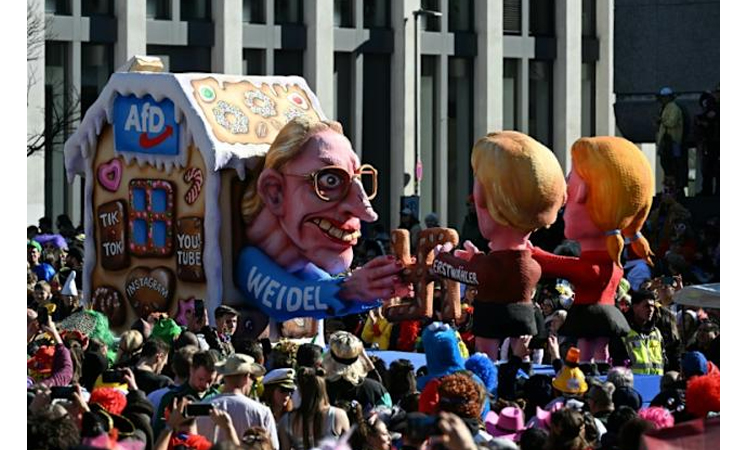News Flash
News Flash

BERLIN, May 3, 2025 (BSS/AFP) - When German conservative leader Friedrich Merz takes power next week, he will quickly have to grapple with a tough question: whether to seek to ban the AfD, which is now designated a right-wing extremist party.
Many critics of the anti-immigration Alternative for Germany (AfD) argue that the decade-old party now soaring in the polls should be prohibited because it spells a threat to liberal democracy.
That assessment was backed when the domestic intelligence agency BfV designated the AfD as an extremist group on Friday in a report that had been years in the works, issued in the final days under centre-left Chancellor Olaf Scholz.
However, many Germans remain opposed to banning the AfD -- arguing that this would disenfranchise the 20 percent of German voters who chose it in February elections, as well as fuelling its martyr status as an anti-establishment party.
Merz could also face opposition from abroad -- especially from the administration of US President Donald Trump, which voiced strong criticism of Friday's BfV decision and which has defended the AfD in the past.
A push for a ban has been gathering momentum in Germany for years, despite warnings of a political backlash and high legal hurdles for such action.
The AfD's senior MP Beatrix von Storch argued on Friday that "every vote for the AfD is now also a vote in defence of our democracy".
- What just happened? -
The BfV on Friday designated the AfD as a "confirmed" right-wing extremist group, citing the "xenophobic, anti-minority, Islamophobic and anti-Muslim statements made by leading party officials".
The classification will help authorities seek greater powers to monitor the party with phone taps and undercover agents.
Outgoing Interior Minister Nancy Faeser said that the AfD in its rhetoric "treats citizens with a migration background as second-class Germans".
"Its nationalist stance is evident in racist statements, especially against immigrants and Muslims."
AfD co-leaders Alice Weidel and Tino Chrupalla slammed the move as "a severe blow to German democracy", pointing out that in current polls, the AfD is the country's strongest party.
They charged that the AfD was being "publicly discredited and criminalised" and threatened to fight back in the courts.
US Vice President JD Vance accused Germany of rebuilding a "Berlin Wall", while Secretary of State Marco Rubio called it "tyranny in disguise" and said "Germany should reverse course".
- Who wants an AfD ban? -
Politicians across party lines have long pushed for a party ban, an idea spearheaded by Marco Wanderwitz, a former lawmaker with the conservative CDU, who on Friday said now the time had come to "promptly initiate ban proceedings".
"The obvious has now been confirmed, so to speak, by the highest authorities," he told the Welt am Sonntag newspaper.
"There can be zero tolerance for and zero cooperation with enemies of democracy," he wrote on X.
Several others agreed, including the CDU state premier of Schleswig-Holstein, Daniel Guenther, who told news weekly Der Spiegel that the government "must now swiftly initiate ban proceedings to protect our democracy".
The AfD has "long left no doubt about its anti-constitutional stance," he said, adding that the new classification will "hopefully also make its voters aware of how dangerous this party is".
SPD MP Ralf Stegner also said he was open to a ban on the party.
"Democrats will fight these enemies of democracy with all political and constitutional means and instruments until the threat to our free democracy is over," Stegner told business daily Handelsblatt.
- Will a ban come? -
The drafters of Germany's post-war constitution set high hurdles for banning a party, mindful of the elimination of dissent in Hitler's Germany.
Only two political parties have been outlawed since 1945 -- the SRP, a Nazi successor party, in 1952, and the West German Communist Party (KPD) in 1956.
A request to ban a party can be submitted by either the lower or upper house of parliament or by the federal government with the Constitutional Court in the western city of Karlsruhe.
That court in 2017 threw out a bid to ban the far-right NPD party, arguing that the xenophobic fringe outfit was too insignificant to spell a real threat to the democratic order.
Faeser said that "a party ban procedure has very high constitutional hurdles for good reasons. One should not rule it out, but continue to handle it with caution."
Famously cautious Scholz warned against any hasty steps, telling Bild daily that "I think this is something we shouldn't rush into".
The leader of the far-left BSW party, Sahra Wagenknecht, labelled moves to isolate or ban the AfD as "slaps in the face for AfD voters which will certainly not convince any of them to change their minds".